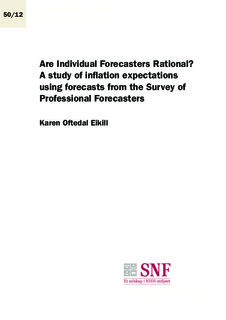| dc.description.abstract | How is the forecast behaviour of professional individuals? Are they accurate and efficient, and how are their performances compared to the consensus’ performance? Do their forecasts differ in the special episodes of the Volcker disinflation and in the recent financial crisis? And are individuals employed in certain industries outperforming individuals employed in other industries? This thesis examines these issues, using survey data of the one-year ahead inflation rate in the United States, derived from the Survey of Professional Forecasters.
Several aspects of the forecasting behaviour of individuals are highlighted. The consensus mean and median forecasts and most individuals are unbiased. They also pass some efficiency tests, even though they are not strong-form rational. The performance of consensus forecasts is better than the performance of the majority of individuals, though several individuals make accurate forecasts. Even though individual differences exist, there are few differences between the forecasters employed in different industry categories. The forecasters performed were worse during the Volcker disinflation, though not as bad as we might expect. And during the recent financial crisis, the performances of forecasters have not worsened. Additionally, the forecasts seem to have improved over time. | no_NO |
